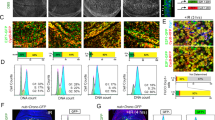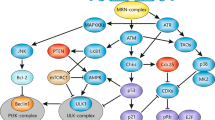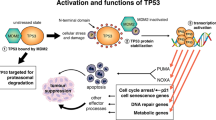Abstract
THE tumour suppressor p53 is required to induce programmed cell death (apoptosis) by DNA-damaging agents1,2. As p53 is a transcriptional activator3 that mediates gene induction after DNA damage4, it has been proposed to be a genetic switch that activates apoptosis-mediator genes5. Here we evaluate the role of p53 in DNA-damage-induced apoptosis by establishing derivatives of GHFT1 cells, that are somatotropic progenitors immortalized by expression of SV40 T-antigen6, which express a temperature-sensitive p53 mutant7. In these cells induction of apoptosis by DNA damage depends strictly on p53 function. A shift to the permissive temperature triggers apoptosis following DNA damage, but this is independent of new RNA or protein synthesis. The extent of apoptotic DNA cleavage is directly proportional to the period during which p53 is functional. These results do not support the propo-sal that p53 is an activator of apoptosis-mediator genes but rather indicate that p53 either represses genes necessary for cell survival8 or is a component of the enzymatic machinery for apoptotic cleav-age or repair of DNA5.
This is a preview of subscription content, access via your institution
Access options
Subscribe to this journal
Receive 51 print issues and online access
$199.00 per year
only $3.90 per issue
Buy this article
- Purchase on Springer Link
- Instant access to full article PDF
Prices may be subject to local taxes which are calculated during checkout
Similar content being viewed by others
References
Lowe, S. W., Schmitt, E. M., Smith, S. W., Osborne, B. A. & Jacks, T. Nature 362, 847–849 (1993).
Clarke, A. R. et al. Nature 362, 849–852 (1993).
Vogelstein, B. & Kinzler, K. W. Cell 70, 523–526 (1992).
Kastan, M.D. et al. Cell 71, 587–597 (1992).
Lane, D. P. Nature 362, 786–787 (1993).
Lew, D. et al. Genes Dev. 7, 683–693 (1993).
Michalovitz, D., Halevy, O. & Oren, M. Cell 62, 671–680 (1990).
Raff, M. C. Nature 356, 397–400 (1992).
Levine, A. J. biol. Chem. Hoppe-Seyler 374, 227–235 (1993).
Ludlow, J. W. FASEB J. 7, 866–871 (1993).
Ginsberg, D., Michael-Michalovitz, D., Ginsberg, D. & Oren, M. Molec. cell. Biol. 11, 582–585 (1991).
Martinez, J., Georgoff, I., Martinez, J. & Levine, A. J. Genes Dev. 5, 151–159 (1991).
Gannon, J. V., Greaves, R., Iggo, R. & Lane, D. P. EMBO J. 9, 1595–1602 (1990).
Wade-Evans, A. & Jenkins, J. R. EMBO J. 4, 699–706 (1985).
Wyllie, A. H. Nature 284, 555–556 (1980).
Yonish-Rouach, E. et al. Nature 352, 345–347 (1991).
Wyllie, A. H., Morris, R. G., Smith, A. L. & Dunlop, D. J. Path. 142, 67–77 (1984).
Tilly, J. L. & Hsueh, A. J. W. J. cell. Physiol. 154, 519–526 (1993).
Barak, Y., Juven, T., Haffner, R. & Oren, M. EMBO J. 12, 461–468 (1993).
Harper, J. W., Adams, G. R., Wei, N., Keyomarsi, K. & Elledge, S. J. Cell 75, 805–816 (1993).
El-Deiry, W. S. et al. Cell 75, 817–825 (1993).
Mack, D. H., Vartikar, J., Pipas, J. M. & Laimins, L. A. Nature 363, 281–283 (1993).
Ragimov, N. et al. Oncogene 8, 1183–1193 (1993).
Devary, Y., Gottlieb, R. A., Lau, L. & Karin, M. Molec. cell. Biol. 11, 2804–2811 (1991).
Hibi, M., Lin, A., Smeal, T., Minden, A. & Karin, M. Genes Dev. 7, 2134–2148 (1993).
Hockenberry, D., Nunez, G., Milliman, C., Schreiber, R. D. & Korsmeyer, S. J. Nature 348, 334–336 (1990).
Wyllie, A. H., Arends, M. J., Morris, R. G., Walker, S. W. & Evan, G. Semin. Immun. 4, 389–397 (1992).
Li, R. & Botchan, M. R. Cell 73, 1207–1221 (1993).
He, Z., Brinton, B. T., Greenblatt, J., Hassell, J. A. & Ingles, C. J. Cell 73, 1223–1232 (1993).
Dutta, A., Ruppert, J. M., Aster, J. C. & Winchester, E. Nature 365, 79–82 (1993).
Brill, S. J. & Stillman, B. Nature 342, 92–95 (1989).
Coverly, D. et al. Nature 349, 538–541 (1991).
McCarthy, S. A., Symonds, H. S. & van Dyke, T. Proc. natn. Acad. Sci. U.S.A. 91, 3979–3983 (1994).
Author information
Authors and Affiliations
Rights and permissions
About this article
Cite this article
Caelles, C., Helmberg, A. & Karin, M. p53-Dependent apoptosis in the absence of transcriptional activation of p53-target genes. Nature 370, 220–223 (1994). https://doi.org/10.1038/370220a0
Received:
Accepted:
Issue Date:
DOI: https://doi.org/10.1038/370220a0
This article is cited by
-
Intracellular FGF1 protects cells from apoptosis through direct interaction with p53
Cellular and Molecular Life Sciences (2023)
-
Elephant TP53-RETROGENE 9 induces transcription-independent apoptosis at the mitochondria
Cell Death Discovery (2023)
-
Influences of cold atmospheric plasma on apoptosis related molecules in osteoblast-like cells in vitro
Head & Face Medicine (2021)
-
Shifting the paradigms for tumor suppression: lessons from the p53 field
Oncogene (2021)
-
Cereblon attenuates DNA damage-induced apoptosis by regulating the transcription-independent function of p53
Cell Death & Disease (2019)
Comments
By submitting a comment you agree to abide by our Terms and Community Guidelines. If you find something abusive or that does not comply with our terms or guidelines please flag it as inappropriate.



